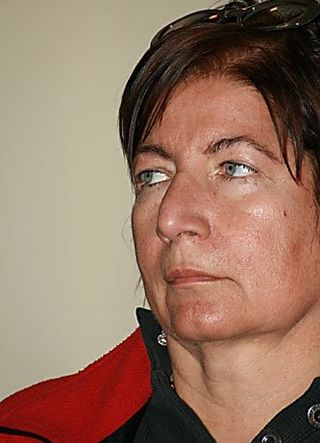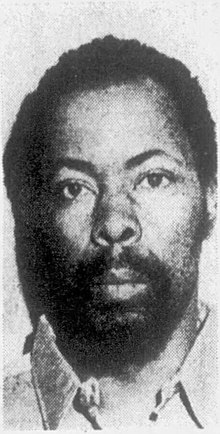
Assata Olugbala Shakur, also known as Joanne Chesimard, is an American political activist and convicted murderer who was a member of the Black Liberation Army (BLA). In 1977, she was convicted in the first-degree murder of State Trooper Werner Foerster during a shootout on the New Jersey Turnpike in 1973. She escaped from prison in 1979 and is currently wanted by the FBI, with a $1 million FBI reward for information leading to her capture, and an additional $1 million reward offered by the Attorney General of New Jersey.

William Moses Kunstler was an American attorney and civil rights activist, known for defending the Chicago Seven. Kunstler was an active member of the National Lawyers Guild, a board member of the American Civil Liberties Union (ACLU) and the co-founder of the Center for Constitutional Rights (CCR), the "leading gathering place for radical lawyers in the country."

The Black Liberation Army (BLA) was an underground Marxist-Leninist, black-nationalist militant organization that operated in the United States from 1970 to 1981. Composed of former Black Panthers (BPP) and Republic of New Afrika (RNA) members who served above ground before going underground, the organization's program was one of war against the United States government, and its stated goal was to "take up arms for the liberation and self-determination of black people in the United States." The BLA carried out a series of bombings, killings of police officers and drug dealers, robberies, and prison breaks.

Mutulu Shakur was a convicted murderer, New African activist, and a member of the Black Liberation Army who was sentenced to sixty years in prison for his involvement in a 1981 robbery of a Brinks armored truck in which a guard and two police officers were murdered.

The black power movement or black liberation movement was a branch or counterculture within the civil rights movement of the United States, reacting against its more moderate, mainstream, or incremental tendencies and motivated by a desire for safety and self-sufficiency that was not available inside redlined African American neighborhoods. Black power activists founded black-owned bookstores, food cooperatives, farms, media, printing presses, schools, clinics and ambulance services.

Marilyn Jean Buck was an American Marxist and feminist poet who was imprisoned for her participation in the 1979 prison escape of Assata Shakur, the 1981 Brink's robbery and the 1983 U.S. Senate bombing. Buck received an 80-year sentence, which she served in federal prison, from where she published numerous articles and other texts. She was released on July 15, 2010, less than a month before her death at age 62 from cancer.

Kuwasi Balagoon, born Donald Weems, was an American political activist, anarchist and member of the Black Panther Party and Black Liberation Army. Radicalised by race riots in his home state of Maryland growing up, as well as by his experiences while serving in the US Army, Weems became the black nationalist known as Kuwasi Balagoon in New York City in the late 1960s. First becoming involved in local Afrocentric organisations in Harlem, Balagoon would move on to become involved in the New York chapter of the Black Panther Party, which quickly saw him charged and arrested for criminal behaviour. Balagoon was initially part of the Panther 21 case, in which 21 panthers were accused of planning to bomb several locations in New York City, but although the Panther 21 were later acquitted, Balagoon's case was separated off and he was convicted of a New Jersey bank robbery.

Silvia Baraldini is an Italian political activist. From the age of 12, she lived in the United States and became a student radical. She joined the Prairie Fire Organizing Committee and the May 19th Communist Organization, groups which aimed to support Black Power and Puerto Rican independence movements. In 1977, Baraldini acted as spokesperson for the protestors outside the court during the trial of Assata Shakur and two years later, she helped to break Shakur out of jail, driving a getaway car. In 1982, she was arrested and imprisoned on a 43 year sentence under the Racketeer Influenced and Corrupt Organizations Act (RICO) for conspiring to commit armed robberies. Baraldini was held in a purpose-built High Security Unit (HSU) in the Federal Medical Center in Lexington, Kentucky which also housed two other women, Susan Rosenberg and Alejandrina Torres. Conditions in the unit were criticized by Amnesty International and it was closed by judicial order.
Edna Mahan Correctional Facility for Women is a prison facility for women of the state of New Jersey Department of Corrections, located in Union Township, Hunterdon County, New Jersey, near Clinton. Its official abbreviation is EMCFW. The facility was named for Edna Mahan, one of the first female correctional superintendents in the U.S.
The Panther 21 is a group of twenty-one Black Panther members who were arrested and accused of planned coordinated bombing and long-range rifle attacks on two police stations and an education office in New York City in 1969, who were all acquitted by a jury in May 1971, after revelations during the trial that police infiltrators played key organizing roles.

Various American fugitives in Cuba have found political asylum in Cuba after participating in militant activities in the Black power movement or the Independence movement in Puerto Rico. Other fugitives in Cuba include defected CIA agents and others. The Cuban government formed formal ties with the Black Panther Party in the 1960s, and many fugitive Black Panthers would find political asylum in Cuba, but after their activism was seen being repressed in Cuba many became disillusioned. House Concurrent Resolution 254, passed in 1998, put the number at 90. One estimate, c. 2000, put the number at approximately 100.
The 1981 Brink's robbery was an armed robbery and three related murders committed on October 20, 1981, by several Black Liberation Army members and four former members of the Weather Underground, who were at the time associated with the May 19th Communist Organization. The plan called for the BLA members – including Kuwasi Balagoon, Sekou Odinga, Mtayari Sundiata, Samuel Brown and Mutulu Shakur – to carry out the robbery, with the M19CO members – David Gilbert, Judith Alice Clark, Kathy Boudin, and Marilyn Buck – to serve as getaway drivers in switchcars.
Dhoruba al-Mujahid bin Wahad is an American writer and activist, Black Panther Party leader and co-founder of the Black Liberation Army. Dhoruba, in Swahili, means "the storm".

Assata aka Joanne Chesimard is a 2008 biographical film directed by Fred Baker and starring Warly Ceriani. The film premiered at the San Diego Black Film Festival and starred Assata Shakur.

Sekou Odinga was an American New Afrikan activist who was imprisoned for actions with the Black Liberation Army in the 1960s and 1970s.
Raymond A. Brown was an American criminal defense lawyer who represented a wide variety of high-profile clients, ranging from politicians to accused spies, including New Jersey state senator Angelo Errichetti, boxer Rubin "Hurricane" Carter and "Dr. X" physician Mario Jascalevich.

Assata's Daughters is an American black power organization of young radical African-American women and girls in Chicago, which operates through a Black, queer, feminist lens, that focuses on political education, organizing, and revolutionary services. The group is dedicated to radical liberatory activism in the tradition of Assata Shakur, a former member of the Black Liberation Army (BLA). The organization is often criticised for this connection, as Assata Shakur was convicted of first-degree murder, armed robbery, and other crimes in 1977 in the murder of a New Jersey State Trooper.

Assata: An Autobiography is a 1988 autobiographical book by Assata Shakur. The book was written in Cuba where Shakur currently has political asylum.
James Edward Daniels was an American serial killer. Originally sentenced to 50-years-to-life for a 1963 murder, he was paroled early and resumed committing crimes, including a double murder. In 1984, shortly after murdering a state trooper in New Jersey, Daniels and a friend were killed in a car crash.














